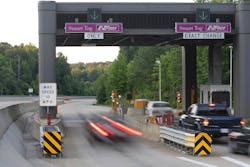Battle shaping up over tolls, public-private partnerships
The prominent positions carved out for highway tolls and public-private partnerships – also known as “P3s” – within President Trump’s infrastructure plan announced during his State of the Union address this week are worrisome to many groups, especially truckers.
That’s because the “for-profit” nature of tolling plans and P3s might very well alter the fundamental nature of highway planning – and not in a good way.
“Tolls are the worst [infrastructure] funding mechanism available and are a highly inefficient use of funds, as a significant portion of every dollar collected – typically 12% to 20%, even with all-electronic tolling – goes to administrative costs and to private sector profits rather than building and repairing roads,” noted Stephanie Kane, spokesperson for the Alliance for Toll-Free Interstates.
“A reduction in bureaucratic red tape and permitting can allow us to more quickly start working on improving our infrastructure,” she added. “Cutting red tape reduces project costs, thus allowing states to avoid having to rely on alternative revenue sources like tolls.”
The Owner-Operator Independent Drivers Association (OOIDA) is also concerned by the Trump administration’s reliance on private investment to achieve its goal of $1.5 trillion worth of infrastructure funding.
“If elected officials think a fuel tax increase would be unpopular, wait until Americans encounter more and higher tolling,” noted Todd Spencer, OOIDA’s acting president.
“The issue of federal funding of highways has been a challenge for policymakers because of negative attitudes toward raising taxes. [We] believe that the most efficient way to raise funds is with fuel taxes, both diesel and gasoline,” he said. “This is opposed to looking to private-public partnerships, the sale or lease of existing roads, or efforts to convert roads into tolled roads.”
Spencer added that the White House and Congress “should find the courage to increase federal fuel taxes, which are a significantly more reliable and efficient source of revenue than tolling.”
OOIDA Spokesperson Norita Taylor told American Trucker that her group is also “raising a little warning” about P3s because they open up “a whole lot of concern.”
She said P3s would “take a public road and make it a for-profit business serving the needs of one entity, not the public. We are also talking about something that affects future generations; we’re basically putting our children and grandchildren in debt.”
Dave Manning, chairman of the American Trucking Associations (ATA) and also president of TCW Inc. in Nashville, TN, noted in an interview this week that his organization remains opposed to placing tolls on existing highways, but is open to the idea when adding new capacity.
He also expressed skepticism of public-private partnerships, saying that “pulling them off is whole lot different than talking about it.”
ATA, like OOIDA, also favors hiking fuel taxes to pay for more spending on roadways and bridges, calling for a 20 cent-per-gallon increase in fuel taxes to occur over four years.
